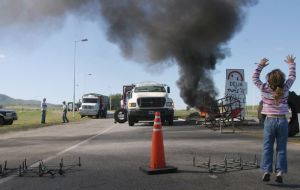MercoPress. South Atlantic News Agency
Confusion and threats in Argentine farmers' conflict
 Estimated losses caused by the lockout at about U$D 750
Estimated losses caused by the lockout at about U$D 750 Argentine farmers and government representatives are set to meet again this Monday for another round of talks in spite of a resumption of road blocks and threats of use of public force to clear the way for trucks loaded with perishable goods.
Farmers resumed on Saturday the lockout, launched on March 13 against higher soy and other grain export taxes, after failing to reach a deal with the administration of President Cristina Fernandez de Kirchner. The protest was temporarily lifted on Friday allowing trucks with food to circulate, and farmers sat down for talks with Cabinet Chief Alberto Fernández, who proposed measures to protect small scale farmers and promised to lift the month long ban on wheat exports. However farmers were disappointed and roadblocks resumed. "We went to negotiate and it turned out that the dialogue consisted of talking vague generalities" said Eduardo Buzzi, chairman of the Argentine Agricultural Federation, FAA. Government officials claim that resumption of road blocks are not the conditions agreed for dialogue. Argentina is one of the world's leading exporters of soy, corn, wheat and beef and the strike has halted trade to major partners such as China and Europe. La Nación estimated losses caused by the lockout at about 750 million dollars. The farm strike also sparked three nights of pot-banging protests by Buenos Aires City residents for the first time since the political and economic chaos of 2001-02, thrusting Mrs. Kirchner into her biggest crisis since taking office in December. Farmers have been angered by a string of government measures aimed at taming food inflation in recent years, including export bans and price controls, but it was the introduction of a sliding-scale tax regime for grains exports that sparked the strike. The new system hikes the levies on soy products at current prices up to 49% from 35%. The President has defended the tax increase as a way to protect consumers from the rising cost of basic food and redistribute wealth in a country where nearly a quarter of the population lives in poverty. Mrs. Kirchner says Argentina has a capacity to produce food for 500 million people. But several years of budget primary surplus have given the Kirchners billions of dollars to distribute among those who support them politically. However the farmers' conflict is causing several rifts in the political scenario. The four farmers' associations which are currently united do not necessary defend the same interests and usually act divided: representing big farming interests and small farmers. Furthermore the success of pickets and roadblocks has also given greater autonomy to local farmers diluting the organization's unity. The cabinet according to Buenos Aires press reports is split between those who favor a dialogue and those who think the conflict has gone too long. Besides so far they have been unable to divide the farmers' united block. But both groups seem to coincide that the political bill of the mistakes committed will have to be paid by the young Economy minister Martin Lousteau and his team of technical advisors in their late twenties early thirties. And if force is used as has been threatened to ensure supplies if something unexpected should happen, who will be responsible. The all powerful teamsters union, and a close ally of the Kirchner administration, was unable to command its force: truckers sided with their year round clients, the farmers. Provincial governors are desperate for a quick agreement fearing about their local finances and a greater dependency from the federal government. Consumers are angry about shortages and soaring prices, shocked when they see milk and perishables dumped but also furious having to endure a conflict that has been going on for 17 days and could get worse. And typical of Argentine television fighting for sensational rating, the 24 hours news channels are presenting the conflict as a competition between farmers and the government.




Top Comments
Disclaimer & comment rulesCommenting for this story is now closed.
If you have a Facebook account, become a fan and comment on our Facebook Page!